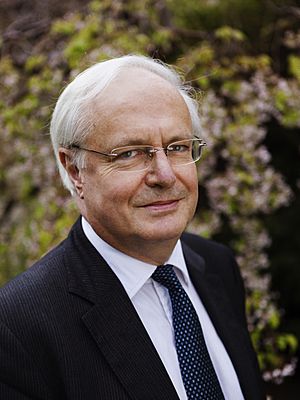Chris Dobson facts for kids
Quick facts for kids
Chris Dobson
FRS FMedSci FRSC
|
|
|---|---|

Dobson in 2014
|
|
| Born |
Christopher Martin Dobson
8 October 1949 Rinteln, Germany
|
| Died | 8 September 2019 (aged 69) Sutton, London, England
|
| Education | Hereford Cathedral Junior School Abingdon School |
| Alma mater | University of Oxford (MA, DPhil) |
| Awards |
|
| Scientific career | |
| Fields | |
| Institutions | |
| Thesis | The conformation of lysozyme in solution (1975) |
Sir Christopher Martin Dobson (October 8, 1949 – September 8, 2019) was an important British chemist. He was a professor at the University of Cambridge and also led St John's College, Cambridge. He was well-known for his amazing work on how proteins in our bodies fold and sometimes misfold. This research helped us understand serious diseases like Alzheimer's disease and Parkinson's disease.
Contents
Early Life and School
Chris Dobson was born in Rinteln, Germany, on October 8, 1949. His father was an officer there. Both his parents, Arthur and Mabel Dobson, were from Bradford in Yorkshire, England. Chris also lived in Lagos, Nigeria, because of his father's job.
He went to Hereford Cathedral Junior School and then Abingdon School. After that, he studied at the University of Oxford. There, he earned his Master's and PhD degrees.
Discovering How Proteins Work
Dobson's main research looked at protein folding and protein misfolding. Proteins are like tiny machines inside our bodies that do many important jobs. For them to work correctly, they must fold into a very specific shape.
Sometimes, proteins can fold into the wrong shape. This is called "misfolding." When proteins misfold, they can clump together. These clumps are linked to serious health problems, especially brain diseases like Alzheimer's disease and Parkinson's disease.
Dobson used special chemistry and biology tools to study these proteins. He wanted to understand how their shape affects their job and how misfolding leads to illness. He made an exciting discovery: even normal proteins can misfold and form harmful clumps called amyloid.
He wrote or helped write over 800 scientific papers. Many of these were published in top science magazines like Nature and Science. His work has been used and referenced by other scientists over 100,000 times.
His Career Journey
Dobson worked at Harvard University for a while. Then, in 1980, he returned to the University of Oxford. He became a professor of Chemistry there in 1996.
In 2001, Dobson moved to the University of Cambridge. He became a professor of Chemical and Structural Biology. In 2007, he took on an important role as the Master of St John's College, Cambridge. He held this position until he passed away in 2019.
In 2012, Dobson started the Cambridge Centre for Misfolding Diseases. This center focuses on finding new ways to treat diseases caused by protein misfolding. In 2016, he also helped start a company called Wren Therapeutics. This company works to find new medicines for Alzheimer's disease.
Awards and Special Honours
Sir Chris Dobson received many awards for his important scientific work.
- In 2018, he was made a Knight Bachelor by the Queen. This means he could use the title "Sir" before his name.
- In 2009, he received the Royal Medal from the Royal Society. This was for his excellent work on protein folding and how it relates to diseases.
- In 2014, he won the Heineken Prize for Biochemistry and Biophysics. He also received the Feltrinelli Prize for Medicine.
He was also chosen as a Fellow of the Royal Society (FRS) in 1996. This is a very high honour for scientists in the UK.
Some of his other awards include:
- Corday-Morgan Medal and Prize, 1981
- European Molecular Biology Organisation (EMBO) Member, 1999
- Davy Medal, 2005
- Fellow of the Academy of Medical Sciences (FMedSci), 2005
- Foreign Honorary Member of the American Academy of Arts and Sciences, 2007
- Foreign Associate of the US National Academy of Sciences, 2013
- Member of the American Philosophical Society, 2018
Mentoring Other Scientists
Dobson was a great mentor to many students and researchers. He guided them as they worked on their PhDs and post-doctoral studies. Many of these people went on to become famous experts in their own fields.
Some of his notable students include:
- Carol V. Robinson at the University of Oxford
- Sheena E. Radford at the University of Leeds
- Clare Grey at the University of Cambridge
Personal Life
Chris Dobson met his wife, Dr. Mary Dobson, at Merton College, Oxford at the University of Oxford. They had two sons, Richard and William.
Sir Chris Dobson passed away on September 8, 2019, from cancer. He was 69 years old.
 | Kyle Baker |
 | Joseph Yoakum |
 | Laura Wheeler Waring |
 | Henry Ossawa Tanner |

